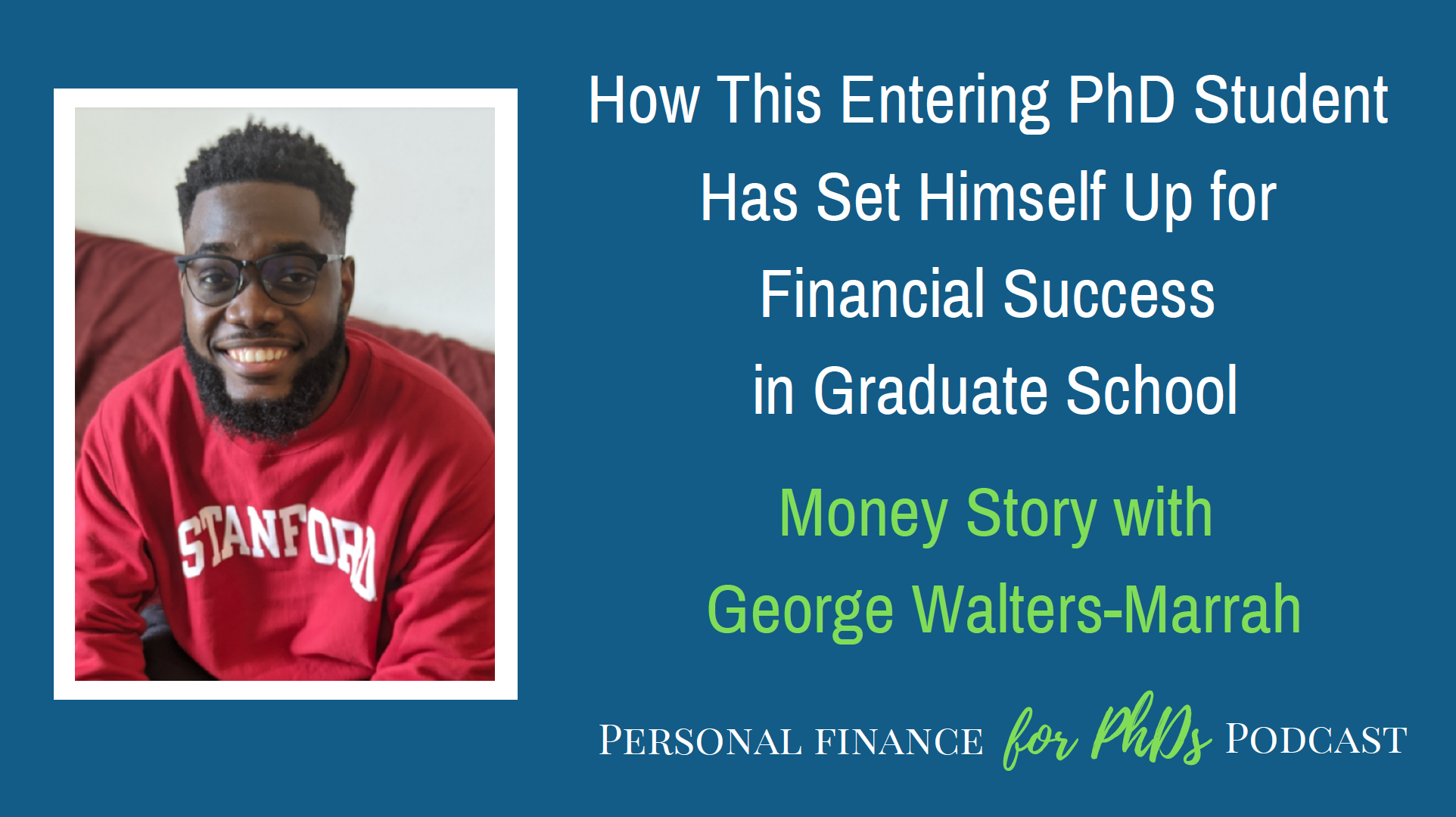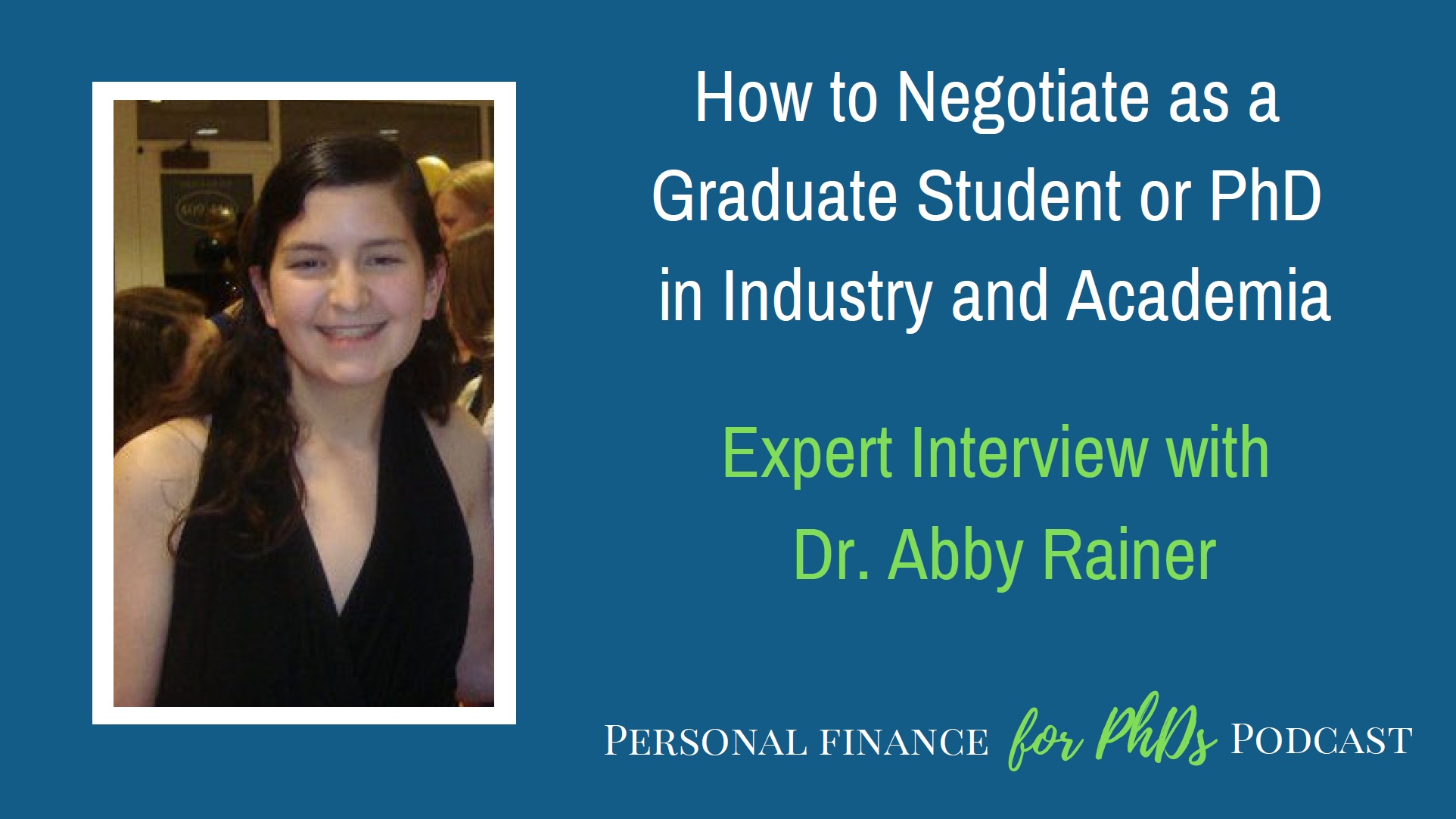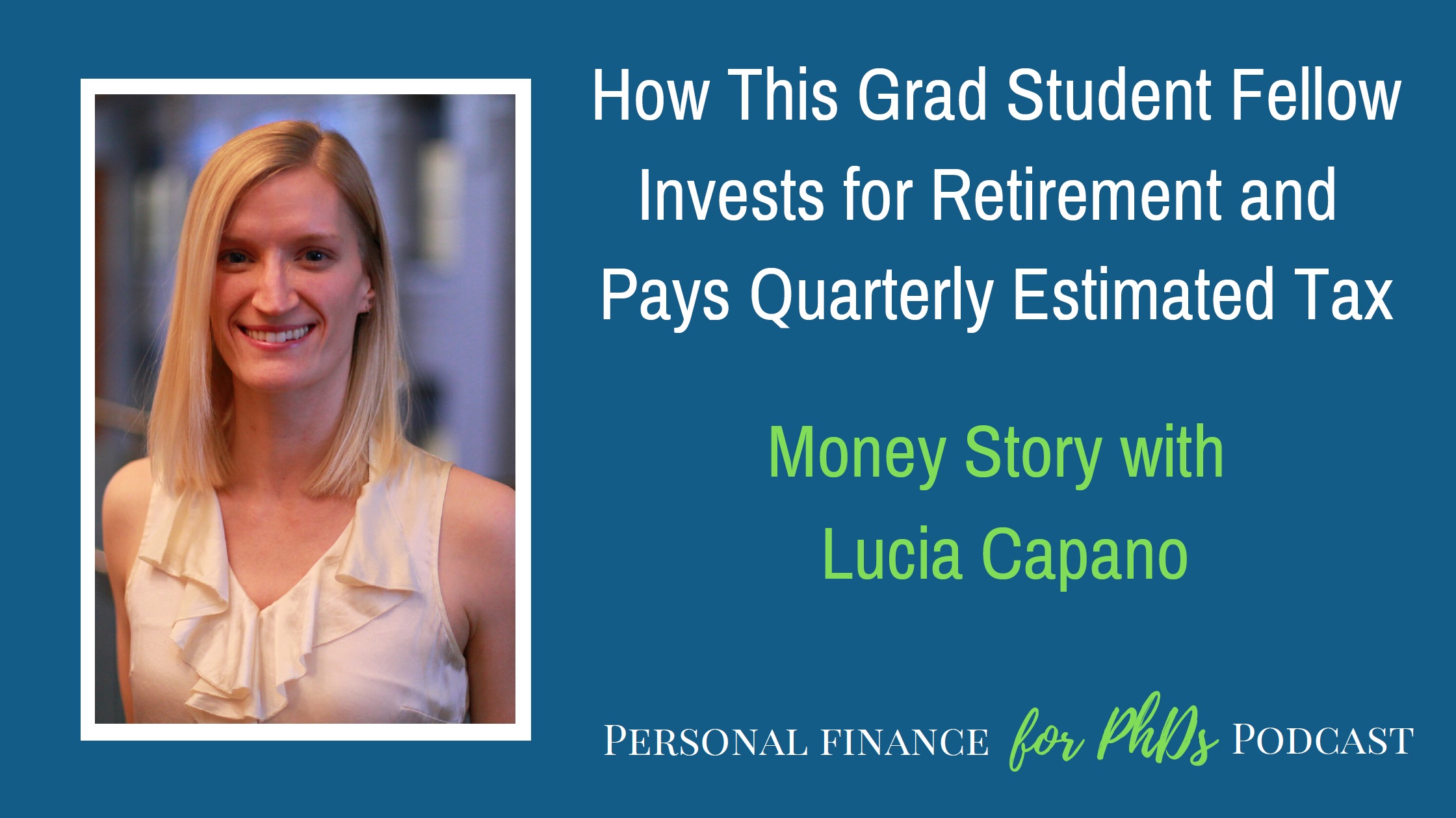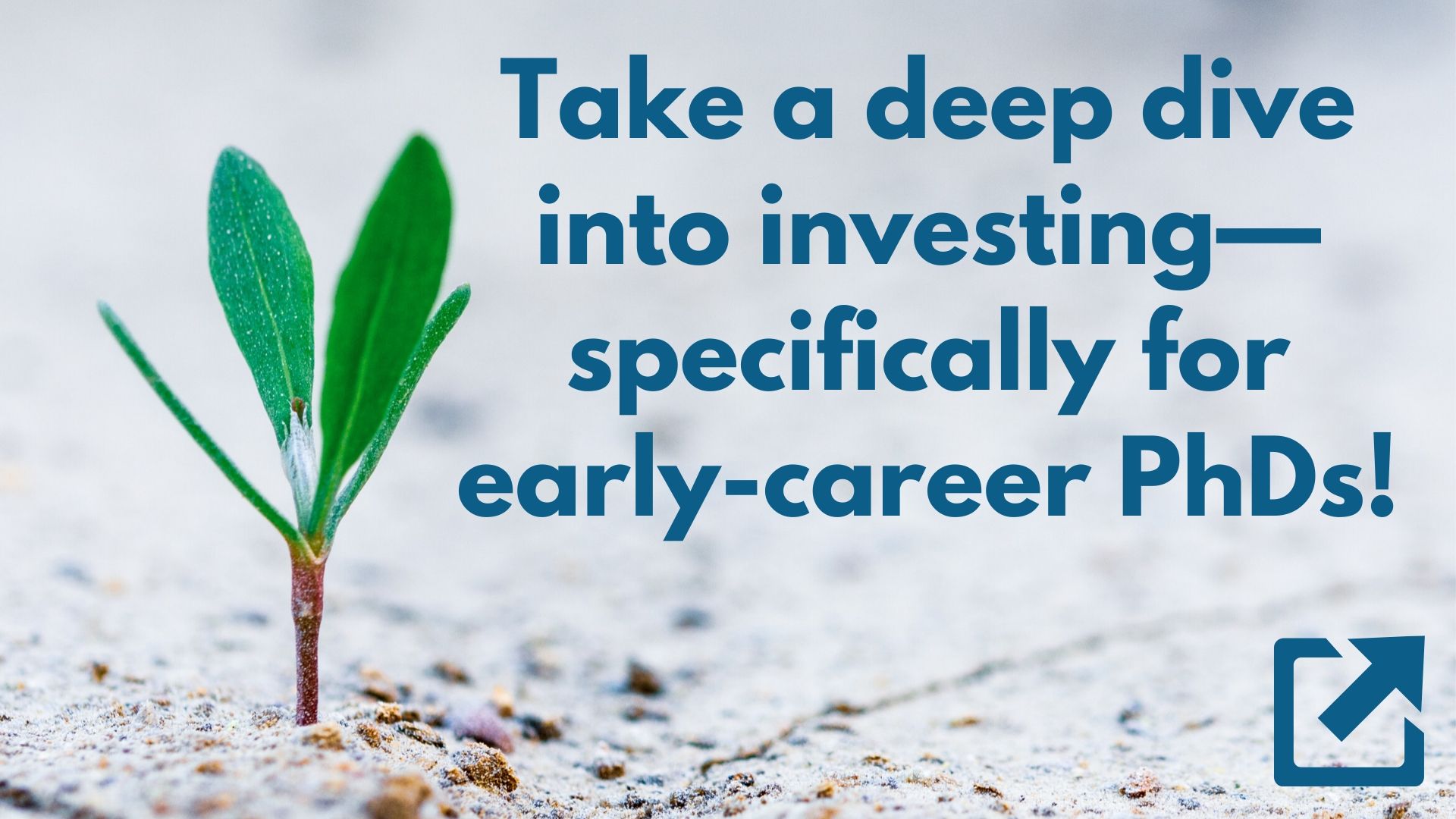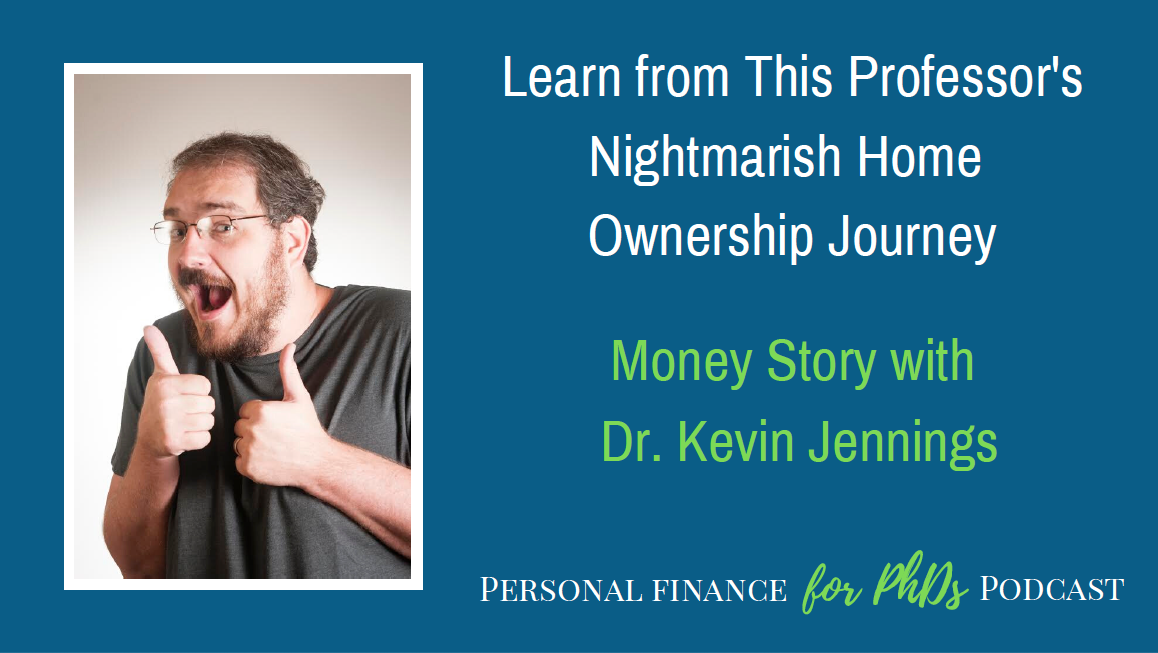In this episode, Emily interviews Courtney Danyel of Academia to Affluence. Courtney became a successful freelance writer after leaving her PhD program in anthropology and moving to one of her field sites. She now teaches other academics how to launch freelancing careers through her course, Endless Freelance Income. In this interview, Courtney gives us her #1 piece of advice for new freelancers, which all academics need to take to heart! She also outlines the simple steps it takes to get your freelance career off the ground. Courtney’s location-independent business has enabled her to earn a very nice income on very part-time work, which will be attractive to academics looking to freelance for a side or main income.
Links Mentioned in the Episode
- Endless Freelance Income
- Courtney’s Jobs on Toast Article
- PF for PhDs: Podcast Hub
- PF for PhDs: Subscribe
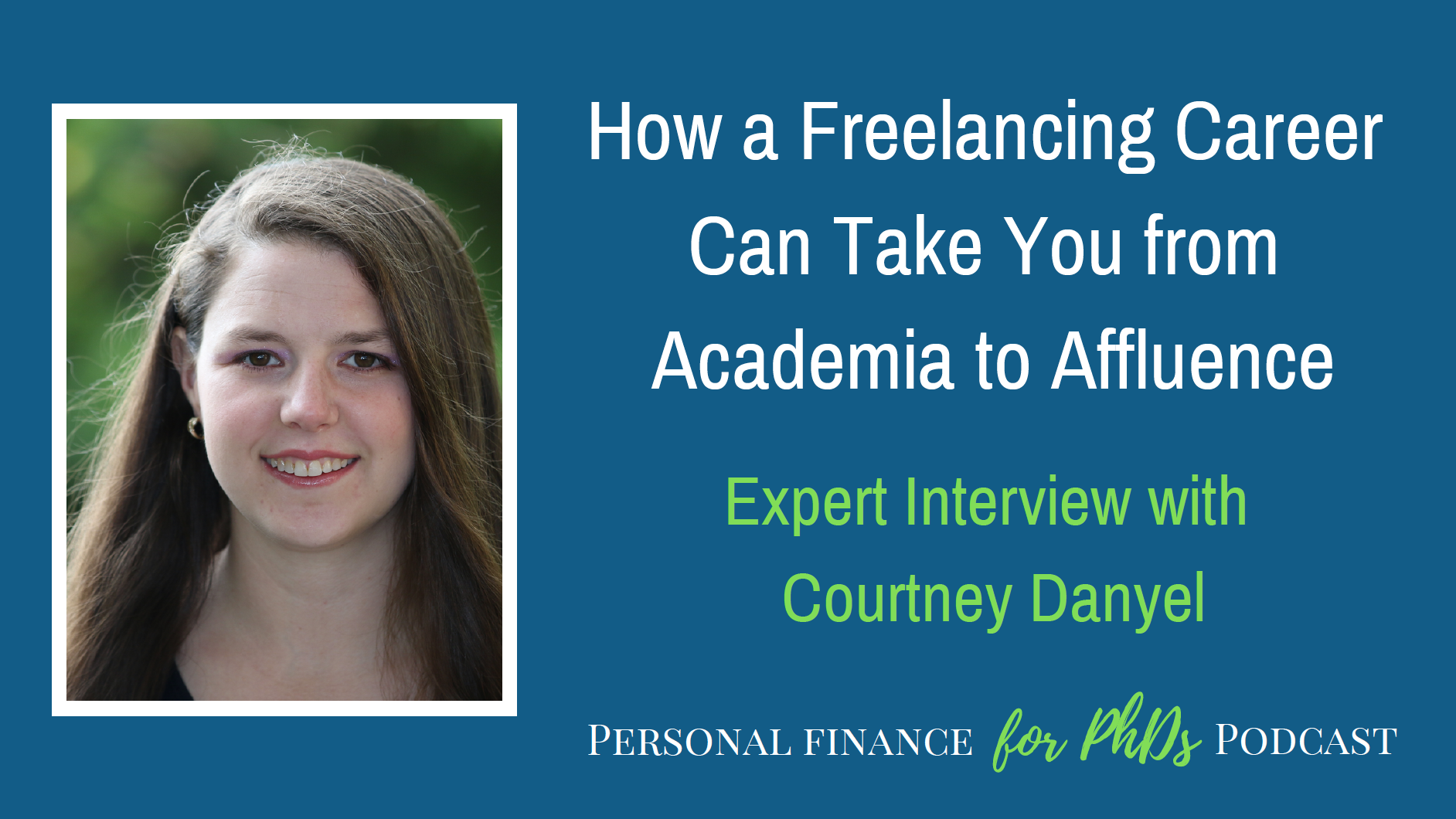
Teaser
00:00 Courtney: I actually do not work full time. I work maybe 15 or 20 hours a week. But I actually still earn a full-time income because I get paid well.
Introduction
00:16 Emily: Welcome to the Personal Finance for PhDs podcast, a higher education in personal finance. I’m your host, Dr. Emily Roberts. This is season six, episode 17, and today my guest is Courtney Danyel of Academia to Affluence. Courtney became a successful freelance writer after leaving her PhD program in anthropology and moving to one of her field sites, but it wasn’t all smooth sailing. She now teaches other academics how to launch freelance careers through her course, Endless Freelance Income. In this interview, Courtney gives us her best advice for new freelancers, which all academics need to take to heart. She also outlines the simple steps it takes to get your freelance career off the ground. Courtney’s location-independent business has enabled her to earn a very nice income on a very part-time schedule, which I know is attractive to academics looking to freelance for a side income or main income. Without further ado, here’s my interview with Courtney Danyel of Academia to Affluence.
Will You Please Introduce Yourself Further?
01:17 Emily: I am delighted to have joining me on the podcast today Courtney Danyel of Academia to Affluence. And I just want to tell you, in one second, how Courtney and I first met online, which is that I saw a post that she wrote a few months back on Jobs on Toast, and I saw her business name, Academia to Affluence, and I was like, this is going to be a good fit. I need to talk with Courtney. So, Courtney, will you please tell us a little bit more about yourself and why your business name is what it is and what you’re up to?
01:47 Courtney: Okay. Yes. So sure. My name is Courtney Danyel. I am an anthropologist by training, but I actually wear quite a few different hats. I’m a freelance business writer also. I’ve been doing that for the past seven years. And as an anthropologist, I’ve worked in Africa in the Central African Republic and Ethiopia. And I actually currently live in one of my field sites, which is Ethiopia. I’ve lived here since I started freelancing seven years ago. And another thing that I started doing late last year was I started mentoring other academics and other people with an academic background to help them transition into freelancing and actually have created an online course for that purpose.
Top Advice for an Academic to Start Freelancing
02:30 Emily: Yeah. So the course name is Endless Freelance Income. I’m actually affiliate for Courtney’s course. I had an opportunity to check it out, you know, before this interview, I think it’s fabulous. And if you want to find out more about that on my end, you can go to pfforphds.com/freelance and find out more about Courtney’s course. And I actually have a couple of bonuses for people in my audience who want to sign up for her course. So, first, you know, right up front, we’re going to get some insights from this course. And then we’ll learn a little bit more about Courtney’s background and her personal story that got her to this point. So, Courtney, your absolute top advice for an academic looking to start freelancing, what is it?
03:10 Courtney: My number one piece of advice for academics who want to start freelancing is to command high pay from day one. That’s because that’s a major mistake that I made when I first started freelancing. I had finished my master’s and I had done part of my PhD and I ended up dropping out of my PhD and decided to switch to freelancing. And as far as I was concerned, I thought I was starting from zero because I was doing freelance writing and I’m writing about topics that aren’t related to my academic discipline. And so, “I don’t know what I’m doing.” And that’s basically what I thought about myself. And so for that reason, I didn’t think that I deserved very high pay. And then I took a lot of jobs that didn’t pay very well at all.
03:57 Courtney: Actually, for the first year and a half or so that I freelanced I was not paid well at all. And then one day I was doing some research for an article that I was writing. I did a lot of ghostwriting back then, which is you write content for other people and it’s published under their name. And I was doing some research for an article that I was ghostwriting for a client. And I Googled something and I clicked on an article that was on forbes.com and I looked at it and it looked familiar. And then I realized that it was written by me. And after I realized that, I started doing some more Googling and I found that my content, stuff that I had written for my clients, had been published on Forbes, Vice, Business Insider, entrepreneur.com and like all these different top business publications. So, that’s what made me realize that, wow, I guess I am a really good writer in other niches besides just anthropology. And I do deserve to be paid well for the work that I do. And after that, I raised my rates, tripled them really, and basically never looked back.
05:05 Emily: I think that this advice is, one, good advice just for everybody, but two, something that academics or post-academics really need to hear, because we are kind of conditioned during graduate school to undervalue ourselves. And it takes really a lot of mental work–and for you a year and a half of actually working in your new field–to undo that conditioning, that mindset that’s been instilled in us. So, I think that it’s something that this audience really, really needs to hear. And I have found as I’ve been involved in academic entrepreneurship spaces, this is one of the top pieces of advice that we pass to one another, which is just raise your rates, raise your rates, raise your rates. I mean, we’re so conditioned. Yeah. We’re so conditioned not only to undervalue our time, undervalue our work, but also think that service is something that you have to do for your job, which I guess in academia, yes, you do have to, but outside of that, no, you should be paid for the value that you bring.
Courtney’s Course Covers Base Pay in Different Freelance Fields
06:09 Emily: So, anyway, it’s a wonderful, wonderful piece of advice. So, actually one thing I wanted to mention is, something I liked in your course is that you speak, of course your experience is in writing, but in the course, you cover a lot more than that, right? Freelancing is a lot more than just freelance writing. And so you talk about base pay rates that you can kind of expect in different fields. Right? I thought that was really that you just got the research jump-started a little bit for the people in the course.
06:40 Courtney: Yeah. You know, for me, I’m basically almost a hundred percent at this point, just a writer, but I actually have a lot of experience freelancing in other areas also, including doing editing and data science and different things. Because you can dip your nib in a lot of different freelance niches. And I also wanted to make the course really open to people who have different skill sets from what I have. Not everybody’s an anthropologist. They have different things, different skills that they bring from academia that they can earn good money from in freelancing also. And so, the course actually introduces several different popular niches, including writing and editing, translation, data science, consulting, sales, and marketing. So, you can kind of discover which one is the best fit for your current skills.
07:30 Emily: Yeah. I mean one of the fields you just mentioned, consulting, is always one that’s very attractive to me when I find other PhDs or graduate students who are consulting. One, because it’s a very broad in flexible kind of terms. So, a lot of people can be consultants in different ways, but also because it tends to command a nice high pay rate if you’re consulting in an area of expertise. I mean, you mentioned earlier that when you went into freelance writing, you were kind of moving away from anthropology. You were writing more about business. But you know, many other people who might be listening to this, they want to double down in their field of expertise. Right? And that’s how they can command those really high pay rates that you mentioned earlier.
08:07 Courtney: Absolutely.
Get Noticed as a Freelancer
08:07 Emily: Okay. So, let’s say you’ve convinced people, people are in your course, they’re going to go down this freelance route, whether it’s writing, consulting, some other field. What’s the best way for them to get started kind of hanging their shingle and letting people know I’m a freelancer now, you can hire me?
08:27 Courtney: Yeah. So, I think the first and most important thing is to build a website. Which, surprisingly to me, I know a lot of people in academia who were like, “Wow, you have your own website. That’s so cool. I wish I could do that.” And I’m like, “Well, you can. You can set up a website in one day. It’s not very difficult.” Yeah. So, building a website is the first and most important thing you can do to make yourself look like a professional freelancer. And that is another thing I discuss in my course. I take you through step by step, how to buy your domain hosting and set everything up, and what the important information you should put on your freelance website to make yourself look like a professional. So, that’s the first step.
09:02 Courtney: And then the next thing that you should do is use networking and cold pitching to get clients. Because there are a lot of freelance websites out there that you can get on where you can apply for jobs and stuff. And I’m not kicking that. I think that’s great also. And I do recommend that you do that, but you won’t get really high-paying clients from those kinds of gigs. You want to first start with networking. And even if you don’t have anybody, you can’t get any clients through your personal network. That’s fine. You can do it through cold pitching. And for me personally, over the years, the clients that I’ve had that have earned me hundreds of thousands of dollars are always the ones that I got through cold pitching. So, that’s what I recommend.
09:43 Emily: Yeah. You know, I actually went through a similar process. I don’t, I guess, identify as a freelancer, I identify as a business owner. But I went through a similar process when I started my business, which is how do I let people know that I’m available for speaking engagements and the other work that I was doing? And so I went through several years as I was building my network where I was cold emailing people. So, I know I don’t really love to be on the receiving end of most cold emails. And so I don’t love to send them either, but honestly, that was the necessary step in the overall process. So, I did a few years of a lot of cold emailing, built up my network, got some responses from that. And now I have basically stopped that. I kind of only do warm-emailing or cultivating my existing network at this point. So, I like that I’ve moved past that, but I feel like it was a really, really necessary start to the whole thing. My business would not have gotten off the ground if I hadn’t just been reaching out to people and trying to start establishing that network. So, it’s not necessarily pleasant, but it is necessary.
10:46 Courtney: It is necessary. And I always found it intimidating in the beginning, especially because you can send 50 emails and not get a response on a single one of them. That’s just the reality of cold pitching. But once you get that one gig and then it earns you a bunch of money, and then it’s like, “Oh, totally worth it.” And you feel motivated to do it more. And so, it can be intimidating. But that’s another thing that for the people who sign up for my course is that they have email support from me. And so, I will help them out with any questions they have. So, if they want to start cold emailing, but they’re not really sure where to start or what to say, they can ask me about that and I’ll give guidance based on the experience that I’ve had over the years.
How Freelancing Enhanced Courtney’s Life
11:28 Emily: That’s actually really nice. Because I know one of the sort of major challenges when you’re starting a business or starting a side income, like freelancing could be at first, is not really having colleagues who you can talk with about the work that you’re doing. And so, that’s just a really great sort of addition, in addition to the excellent content in your course, is also to be able to have interactions with you to get that support, again, as you’re building your network of your peers who are also freelancing or doing other kinds of work like that. So, I find that really valuable. I’ve been part of a couple of communities and I love just, you know, some people process things by talking to other people and they want some outside input, and you’re providing that. So, that’s super valuable. Now that we’ve gotten those excellent nuggets of advice from you, let’s talk a little bit about you and your story. I know you gave a quick overview at the start of the interview as to how you got into this, but why don’t you dive into a little bit more detail about what freelancing has done for you?
12:30 Courtney: Yeah, so, I flew through my bachelor’s degree and flew through my master’s holding my breath. I did that all really young and then I was starting my PhD. By the time I started my PhD, I was completely burnt out. It was just, I don’t need to explain how difficult academia is to anybody who’s listening to this podcast, but yeah, it was just too much for me and I needed a break. And the thing that I always loved about anthropology, the one thing that I love the most about it was being able to do field work. But field work was something that I was only ever able to do, if I was lucky, one or two months out of the year. And the rest of the year was spent in a windowless office doing research and data entry and stuff like that.
13:17 Courtney: And so, I wanted to just have the field work experience without the office experience. I just wanted to do something different. And so I was like, “Okay, I’m going to move to my field site. I love it there. I think it’s great. And I want to go live there. How can I do that? I don’t know.” And so, I actually ended up talking to my mom about it, who she actually works online. And she’s like, “Well, why don’t you start freelance writing? You don’t need to earn a lot of money in order to earn a living, especially if you’re in Africa. So, just give it a go.” And so, that’s what I did. I dropped out of my PhD program. I sold my car, used that to buy a plane ticket, and I left and I started freelancing here in Ethiopia and I’ve actually been here ever since.
13:59 Courtney: So, that has enhanced my life a lot because I get 12 months of sunshine, which is really important to me. And I love the environment and I love the culture and learning languages. And so that location-independence was really, really valuable to me for my mental health and just my personal happiness. And then the other thing that is always important is money. So, I earn very, very good money as a freelancer. I didn’t the first year and a half, as I mentioned before, but once I figured out that I was worth it, I started demanding it and asking for it. And I got it. And I continued to get it every time I raised my rates. People say, yes, somebody says yes. You know? And so, that’s really important, especially compared to academia, unfortunately. After the first two years of freelancing, I started earning more money than my former PhD advisor earns. And they’re a tenured professor. So, that’s something.
Location Independence and High Pay Rates
14:58 Emily: Yeah. I want to explore each of those points a little bit more because they’re both super attractive. The first one, the location-independence, you explained how that played out in your life. It enables you to move to the place that you want to live at one of your field sites and have sort of your whole life feel a little bit more like what you enjoyed the most about your academic experience. And of course, if someone else wants to do that and wants to make freelancing the way they make it happen, that’s awesome. I can think of some other benefits, which is, as you know, academic careers and PhD careers, you don’t have a lot of control over where you live, especially if you’re in academia. But even if you’re just a highly specialized professional, there are certain industries that are concentrated in certain cities, and so forth.
15:44 Emily: So, there may be reasons related to your PhD why you want to stay in a certain place, and this freelancing can follow you wherever you go. Side note, I as a, what’s called a trailing spouse–so we live where we live because my husband’s job is here and we anticipate moving because my husband may be changing jobs from time to time and he’s highly specialized–I get to take my business wherever I go. So, I don’t have to start over in a new job every time I might need to move. So, that’s a real, real benefit that I see that location-independence. And then of course on the money side, because this is a personal finance podcast. So, commanding the high pay rates, getting paid very well for your time.
16:26 Emily: Not just for people like you who are doing this full time, but as a side hustle. If that’s the way this starts, or that’s the way you want to keep this as you move forward in your freelancing career, as well as your academic or PhD-type career. It’s really nice when you can make a good amount of money for not that much time invested. As a PhD student, for example, you might be able to work, I don’t know, two hours a week, five hours a week, some pretty small number, but still get a really, really nice amount of money out of that small, small side hustle. And when you compare that, when you’re thinking about hourly rates to the other kinds of work that some PhDs do, or some people do when they’re still in graduate school or PhD training, it’s really nice, right?
17:10 Emily: To not have to work so many hours and also to have maybe a more like stimulating type of work, intellectually that is, yet something that is different probably from what you’re doing as your main day to day job, if this is still a side hustle. I think that’s really attractive in terms of having balance in your life. It’s awesome that you’ve been able to command these high pay rates and put together this full-time career, making a very nice income from Africa, from where you wanted to live. And I definitely want others to consider following your tracks.
17:44 Courtney: You were saying that this is like a full-time job for me, which it kind of is. But a lot of other people who listen to your podcast are people who are in academia to stay and they would like to have some additional stream of income to add on top of that. So, one point that I would like to make is that I actually do not work full-time. I work maybe 15 or 20 hours a week. But I actually still earn a full-time income because I get paid well. And this is something that I choose for my personal life because I have three foster kids and I homeschool them. And between that, and being a mom and, keeping my yard clean, I work 15, 20 hours a week on freelancing and that’s about it. And so you could do this as a part-time gig and still earn a lot of money. It doesn’t have to become like your full career. You don’t need to invest a hundred percent of your time in it. I don’t even invest a hundred percent of my time and I don’t even have another source of income. So, that’s something.
18:41 Emily: Yeah. Thank you so much for adding that. That’s awesome that you’re earning this like great, full-time income from part-time work. I actually also work part-time as well. I work about 25 hours a week and I’m quite happy with that balance actually. So, I really like that you added that point because the whole working 40 hours a week thing is so job-centric. That’s what our culture has decided–well, really not just 40, much more than 40 hours a week–is like the proper amount of time to be working. And once you start your own business, once you strike out on your own, all the rules are out the window, right? You can define what you want your work life to look like completely. And that goes both location and time and amount of money as we talked about earlier. So, I’m so glad that you added that. Thank you.
Endless Freelance Income: What to Expect
19:28 Emily: Let’s say someone is super excited about what we’ve been talking about. They want to start down their freelancing career in whatever field that might be in, and they want to sign up for your course, which again, they can do through pfforphds.com/freelance. And you can get the couple of bonuses that I created there. So, what can someone expect to find when they start your course?
19:49 Courtney: Okay. Well, first I guess I’ll explain who the course is for specifically. After I started freelancing, even in the first year or two I started freelancing, I got emails from people that I know. From people in my former cohort, professors that I know, people in grad school who heard, “Hey, I heard that you left academia and started freelancing. And I’d like to do something similar. Can you give me some advice?” And so, I’ve been giving advice to people for years. I get emails several, 10 or 15 times a year, I get an email from somebody, or I get a referral from somebody who’s in academia and they want to make the switch, or they want to add on to an additional stream of income through freelancing. And so, after years of basically kind of helping people just as like a side project, I decided to create a course to basically do what I was already doing, but do it in a more organized and formal way to help people.
Ch. 1: Intro to Freelance, Ch. 2: Identify Your Valuable Skills
20:47 Courtney: So, that’s what I created this course for. It’s called Endless Freelance Income, how to turn your liberal arts degree into an endless freelance income. However, even if your background is in science or any of the STEM areas, it can also be relevant to you. So, the course at the very beginning, it just introduces you to the online freelance world. So, if you don’t know the first thing about it, don’t worry. I will explain it to you in the course. That’s the first chapter. And then the next chapter, which I think is probably the most valuable one for people, is helping you identify what your most valuable and profitable skills are, from academia, that you can translate into freelance income. Through the mentoring there, I also kind of help people–people tend to overlook their skills. They think, “Oh, I guess I can write,” or like, “I guess I can do some data analysis, but I don’t have a degree in that. So, I’m not qualified to do that.” So, kind of just help people break that down. Imposter syndrome follows you outside of academia. I learned that the hard way. And so, just kind of help people to understand, no, these are valuable skills and you can utilize them.
22:08 Emily: What I liked about that portion of your course, what I noticed there is that you have worksheets in here, right? So, it’s not just like, I’m just reading all this material. It’s a very engaging format, right? So, you’re giving people some little tools they can use to do things like brainstorm about their own skillsets, which I totally agree with what you said. We tend to discount our own skills or our own areas of expertise unless we have a degree in it. That’s very important to us in academics that we have a degree in XYZ. But I know, personally, like my field is now personal finance and I don’t have a degree in personal finance and that’s okay. I’m still confident at this point that I am an expert in this area because of my long experience. But I think that for people who aren’t quite there yet, it is a little difficult of a hurdle to overcome. So, your course definitely helps with that.
22:55 Courtney: Yeah. And you know, same story for me, I’m an anthropologist, but I write in marketing topics, marketing and entrepreneurship. And I am an expert because I became one. And that’s it. And so, you can do it, too. That’s basically what the course helps you to figure out. So, once you’ve kind of broken down and pulled your skills out, then the next chapter teaches you about several different major freelance niches that you can get into. And I already mentioned before, there’s writing, editing translation, administrative support, design and creative, customer service, consulting, data science analysis, and sales and marketing are the ones that I go through. So, those are the main ones. And then it walks you through how you can look at your current skills and line them up with what each of these niches demand, or what they need.
How to Look Professional as a Freelancer
23:46 Courtney: And then it also helps you think about which one’s most interesting to you too. Because it’s not just about your skills, it’s also about what you want to do, right? And then you can choose your niche. And then after that, the course goes through how to make yourself look professional as a freelancer. One thing that I discovered when I left academia is that I needed to tone down my CV. What’s professional in academia and what’s professional in the online business world are very different. And so I kind of teach people how to make yourself look professional online as opposed to professional as a 10-page CV, or something like that. So, that’s the next step. And then the next thing after that is teaching you how to research your niche so that you can figure out what the going rates are in your niche, the going rates for somebody with your skill level, and just kind of also to weed through the riffraff.
24:47 Courtney: Because a lot of people out there, you know, they say $10 an hour or something like that. Yeah. You don’t need to pay attention to those people. So, to figure out how much you should be charging in the beginning. And then after that, the course takes you through step by step how to create your website, which I mentioned before. And then it walks you through what you need to do to land your first client. And that is the course in a nutshell, as it is right now. I plan to add onto it. Like I said before, I think cold pitching is important. So, one thing I plan to add on to it in the future is more information about walking people through how to set up a cold pitching scheme. And so, that’s something I plan to add onto it in the future. And the good news is that if you have access to the course, you buy it now, you’ll have access to all that future material as it comes up.
Bonus Content from Emily
25:34 Emily: That sounds awesome. As I said earlier, I read through the course prior to this interview, and it really breaks things down and simplifies them and doesn’t make it seem so intimidating to start down this path of freelancing. You really don’t over complexify anything. It’s very simple steps to follow, to get started. So, I wanted to mention for my audience, if you choose to buy Courtney’s course through my affiliate link again, pfforphds.com/freelance, I’ve created a couple of extra bonuses for you. So, one that everyone will receive who buys through my link is a free video training on how to budget with an irregular income, right? So, like I’m really confident, you go through Courtney’s course, you’re committed to this. Like you’re going to be starting down that path of having freelance income.
26:18 Emily: And you know, that’s a really great thing, but it can also pose some budgeting challenges. So, I’ve created a training that you’ll get for free when you buy the course on how to manage that. Like manage your finances when you have a side income stream that’s irregular, maybe growing into a full-sized income stream over time. So, it’ll help you with that. And then for the first five people who buy the course, so not everyone, but just the first five, I’m going to offer a free 20-minute financial coaching session. So, what I think will be really great about this is if you schedule this for maybe like two months out from when you start taking the course, it’ll be a nice little accountability point to meet with me at that time and say, “Okay, Emily, here’s the income stream. I’ve established it. I got my first invoice over here. I’ve gotten paid for the first time.” And so we can talk more about what you want to do with that money. How it’s going to help you reach your goals. How it’s going to fit into your budget. Do you want to be paying debt? Do you want to be investing it? So, we can talk about all that kind of stuff. So, that’s how I recommend you use that bonus if you’re one of the first five to sign up is schedule it a little ways out. So you actually have that income stream established by the time we meet together. And I’ll certainly be asking you, have you been implementing everything from the course? So again, pfforphds.com/freelance is where you can sign up and of course link through to find out more about the course from Courtney.
Best Financial Advice for Early-Career Academics
27:38 Emily: So, Courtney, we’ve come to the end of the interview. Thank you so much for what you’ve shared with the audience today. I think it’s been excellent advice and thank you for telling us more about Endless Freelance Income. So, final question that I ask all my guests is what is your best financial advice for another early career academic or maybe recovering academic like you?
28:00 Courtney: My best advice would be don’t put all your eggs in one basket. Something my dad told me when I was 17 years old and I didn’t know what it meant at the time, but now I do. So, even if you’ve got your dream job, even if you’ve gotten that research position or that tenure track job or whatever, you never know what’s going to happen in the future. That’s something we’ve learned this year in 2020, I think. And so, having an additional stream of income is really valuable. And I know that’s what Emily talks about all the time on her blog. And the thing about freelancing is that there’s no risk in starting and giving it a try. And you can just work on it in your spare time and you can build it up over time in whatever time you have. And if you don’t have time to work on it, you don’t have time to work on it. And it doesn’t hurt you to work on this and build up this extra stream of income. You don’t have to be like me where you leave your job and leave your country and change your whole career. I think that all academics should be doing something on the side, some kind of freelancing, blogging, something. So, that’s my advice.
29:06 Emily: Yeah. I totally agree. You know, not all the eggs in one basket can apply it to a lot of different areas, but certainly when it comes to your income, having a job or even being in graduate school means you’re dependent on another institution to decide to continue to give you work. But the advantage of freelancing is that you spread that around to a lot of different clients and it’s much less risk. Yeah, one client drops off, no big deal. You can supplement that by hustling up a few new clients. But if your employer decides they don’t want to work with you anymore, that’s kind of a devastating like life thing. So, excellent, excellent advice. What I also like about what you said is that if you do the work, for instance, by going through your course. If you do the work to establish yourself as a freelancer, and you devote even something like an hour a week to it, like I mentioned earlier. As long as that income stream is established and in a field like freelancing, it’s something that you can decide to turn up or turn down as you need in your own life.
30:00 Emily: So, for example, if you have an unfunded summer, you know, some people–again, you mentioned 2020–some people in 2020 have late in the game discovered that they don’t have summer funding in the way that they thought they would. Yes. Their funding will pick up again in the fall. It’s not like they’re going to drop out of graduate school and get a full-time job or whatever. But for a few months, the income that they thought was secure is not there. So, once the situation is upon you, it’s very difficult to scramble and kind of fix it. But if you’ve already established that one hour per week freelancing job, then that’s something you can ramp up or ramp down as your life allows, as your money situation requires. So, I just think that’s a real advantage to establishing yourself. Even if you’re not going to do it, like you just said, 15 hours a week to make the equivalent of a full-time income. So, great, great advice. Courtney, thank you so much for joining me on the podcast today. It was a real pleasure to talk with you again.
30:54 Courtney: Thanks so much, Emily. Thank you.
Outtro
30:55 Emily: Listeners, thank you for joining me for this episode. Pfforphds.com/podcast is the hub for the Personal Finance for PhDs podcast. There, you can find links to all the episode show notes and a form to volunteer to be interviewed. I’d love for you to check it out and get more involved. If you’ve been enjoying the podcast, please consider joining my mailing list for my behind the scenes commentary about each episode. Register at pfforphds.com/subscribe. See you in the next episode! And remember, you don’t have to have a PhD to succeed with personal finance, but it helps. The music is Stages of Awakening by Podington Bear from the free music archive and is shared under CC by NC. Podcast editing and show notes creation by Meryem Ok.

